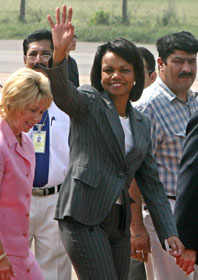NEW DELHI, Oct 4, 2008 (AFP) - US Secretary of State Condoleezza Rice arrived in India today to showcase a historic bilateral nuclear deal, but last-minute hitches raised doubts that the pact would be signed on her trip.
A signing delay would be another bump in a three-year rollercoaster for an agreement aimed at lifting a ban on US-Indian civilian nuclear trade imposed after India's first nuclear test in 1974.
Rice, who was due to meet Indian Prime Minister Manmohan Singh and Foreign Minister Pranab Mukherjee, said the problem was bureaucratic rather than substantive.
“There are a lot of administrative details that have to be worked out,” Rice told reporters on her flight to New Delhi. “I'll let you know (if the signing is on) but the whole purpose of this trip is to move forward, not to look at where we are,” she added.
 |
| Rice (C) waves upon her arrival at Indira Gandhi International Airport in New Delhi yesterday. AFP |
Both houses of the US Congress voted in favour of the landmark nuclear deal this week, but President George W. Bush has yet to sign it into law.
While Rice did not elaborate on the administrative snags, she insisted she did not have to wait for Bush's signature before initialling the pact herself.
According to Indian foreign ministry sources, however, New Delhi wants the presidential seal before moving forward.
The deal offers India access to sophisticated US technology and cheap atomic energy in return for New Delhi allowing UN inspections of some of its civilian nuclear facilities.
Military nuclear sites will remain closed to international inspections.
Critics say it undermines global efforts to curb the spread of nuclear weapons, because India has refused to sign the international non-proliferation treaty (NPT).
The Bush administration had to lobby hard to win approval for the deal from the International Atomic Energy Agency (IAEA), the UN nuclear watchdog, and the Nuclear Suppliers Group (NSG), which controls global atomic trade.
Rice put the agreement in the context of a budding US-India strategic partnership that covers cooperation on defence, education, the economy, agriculture and other fields.
The United States now has a “broad, strong and deep” relationship with India, she said.
But Daryl Kimball, executive director of the US Arms Control Association and a strong critic of the nuclear pact, said the Indians were likely to be unhappy with a promise Rice made to Congress in return for its quick adoption.
Rice pledged to push as hard as she can to have the NSG “amend its guidelines to prohibit the transfer of enrichment and reprocessing technology to states that haven't signed the NPT,” Kimball said.
India badly wants such technology which can be used for both peaceful and military purposes, Kimball said.
Prime Minister Singh has had a rough ride over the deal at home.
The main opposition Hindu nationalists and the communists have both slammed it as curbing India's military options and bringing the country's foreign policy too much under US influence. Even after the accord is signed, US firms cannot do business until Delhi signs a safeguards agreement with the IAEA.
The US Chamber of Commerce said with India's 34-year nuclear isolation now history, a potential 150 billion dollars (107 billion euros) of new investments were expected in terms of new nuclear generating capacity by 2030. The agreement is a key foreign policy success for Bush who agreed to it with Singh in 2005 as part of a strategic partnership between the two biggest democracies.
During her talks in India, Rice said she would also discuss India's support for boosting Afghan political and economic institutions.
She was scheduled to leave for Kazakhstan on Sunday. |

